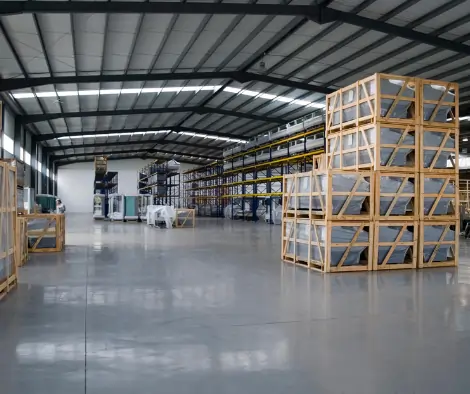Today’s small enterprises constantly seek innovative ways to streamline operations and reduce overhead costs. One solution that has gained significant traction in recent years is shared warehousing. This concept, which allows multiple businesses to utilize the same storage and distribution facilities, has revolutionized how small companies manage their inventory and logistics.
By pooling resources and choosing to work from a coworking space in Calgary, businesses can access professional warehousing services that were once the exclusive domain of larger corporations. This approach offers substantial cost savings and gives small businesses the flexibility and scalability they need to compete in an ever-changing market. As we delve into the world of shared warehousing, we’ll explore how this model is transforming the landscape for small businesses, offering them a viable alternative to traditional warehousing solutions and enabling them to focus on growth and innovation.
Benefits of Shared Warehousing for Small Businesses
The various benefits of shared warehouses for small businesses include:
- Cost Savings
One of the primary advantages of shared warehousing is the significant reduction in operational costs. Small businesses can avoid the hefty expenses associated with leasing or purchasing their own warehouse space, including:
- Property costs
- Utility bills
- Maintenance and repairs
- Security expenses
- Insurance premiums
 By sharing these costs with other businesses, companies can allocate their resources more efficiently, investing in core business activities rather than infrastructure.
By sharing these costs with other businesses, companies can allocate their resources more efficiently, investing in core business activities rather than infrastructure.
- Flexibility And Scalability
Shared warehousing offers unparalleled flexibility, allowing businesses to scale their storage needs up or down based on demand. This is particularly beneficial for:
- Seasonal businesses
- Startups experiencing rapid growth
- Companies with fluctuating inventory levels
Unlike traditional leases that lock businesses into fixed spaces for extended periods, shared warehousing enables companies to adjust their storage requirements on short notice.
- Access To Professional Facilities And Equipment
Many small businesses lack the capital to invest in state-of-the-art warehousing facilities and equipment. Shared warehousing provides access to:
- Modern storage systems
- Advanced inventory management software
- Specialized handling equipment
- Temperature-controlled areas for sensitive goods
These resources can significantly improve operational efficiency and product quality without substantial upfront investments.
- Reduced Labor Costs
Shared warehousing facilities and shared workspace settings often come with trained staff managing various aspects of warehousing operations. This arrangement allows small businesses to benefit from professional warehouse management without hiring and training their full-time employees. It can lead to:
- Lower payroll expenses
- Reduced training costs
- Access to skilled labor without long-term commitments
- Improved Geographical Reach
For small businesses looking to expand their market presence, shared warehousing can provide strategic advantages:
- Access to multiple distribution centers across different regions
- Ability to store inventory closer to customers for faster delivery
- Opportunity to test new markets without significant investment in infrastructure
This expanded reach can help small businesses compete more effectively with larger competitors and improve customer satisfaction through faster, more efficient deliveries.
- How Shared Warehousing Works
Understanding the mechanics of shared warehousing is crucial for small businesses considering this option:
- Space Allocation—Warehouses are divided into sections, and each business is allocated space based on its needs. This space can range from a few pallets to larger dedicated areas.
- Inventory Management – Advanced inventory management systems track each business’s stock levels, locations, and movements. This ensures accurate record-keeping and prevents mix-ups between different companies’ inventory.
- Order Fulfillment – When an order is received, warehouse staff pick, pack, and ship the items on behalf of the business. This process is often integrated with the company’s e-commerce platform for seamless order processing.
- Receiving and Storage – Incoming shipments are received, inspected, and stored according to each business’s specifications. This can include special handling for fragile or temperature-sensitive items.
- Reporting and Analytics – Most shared warehousing providers offer detailed reporting on inventory levels, order fulfillment rates, and other key metrics, helping businesses make informed decisions about their supply chain.
How To Choose the Right Shared Warehousing Company
When looking for an experienced and reputable shared warehousing provider, conducting thorough research and due diligence is crucial, and you should:
- Start by identifying providers in your target area and creating a shortlist based on their reputation and years of experience in the industry. Look for companies with a proven track record of serving businesses similar to yours in size and sector.
- Check online reviews and testimonials from current and past clients to gauge customer satisfaction. Don’t hesitate to ask the provider for references and case studies demonstrating their expertise and success in handling shared warehousing operations.
- Evaluate the provider’s technology infrastructure. A reputable company should offer advanced inventory management systems, real-time tracking capabilities, and seamless integration with various e-commerce platforms. This technological prowess is essential for ensuring efficient operations and minimizing errors.
- Consider the range of services offered. Experienced providers often go beyond essential storage and offer value-added services such as order fulfillment, kitting, returns management, and custom packaging. Assess whether these additional services align with your business needs and growth plans.
- Visit the facilities in person. This will give you a firsthand look at the warehousing conditions, security measures, and overall operations. Pay attention to cleanliness, organization, and the professionalism of the staff.
- Inquire about the provider’s disaster recovery and business continuity plans. A reputable company should have robust systems to protect your inventory and ensure uninterrupted service in case of unexpected events.
- Scrutinize the provider’s pricing structure. While cost-effectiveness is a key benefit of shared warehousing, be wary of prices that seem too good to be true. Ensure you understand all fees, including hidden charges for additional services or peak season adjustments.
- Look for certifications and compliance with industry standards. Reputable providers often hold relevant certifications for quality management or specific certifications relevant to your industry, such as FDA compliance for food and beverage storage.
- Finally, assess the provider’s financial stability. A reputable company should be willing to share information about its financial health to assure you of its long-term viability as a business partner.
Specialized Niche Services
We may see the emergence of shared warehousing providers catering to specific industries or product types, offering tailored services and expertise. The growing interest in shared warehousing among small businesses is a testament to its effectiveness as a cost-saving and efficiency-boosting solution. As more entrepreneurs and small business owners become aware of the benefits, the demand for information about shared warehousing is on the rise.
Many actively explore how this model could align with their specific operational needs and growth strategies. Shared warehousing’s flexibility and scalability particularly appeal to businesses looking to optimize their supply chain without committing to long-term leases or significant capital investments.
That’s why an increasing number of small businesses are adopting shared warehousing solutions or seriously considering them as part of their expansion plans. This trend will likely continue as more success stories emerge and the shared warehousing industry evolves to meet the diverse needs of small enterprises across various sectors.
Transform Your Workspace Today – Discover Our Flexible Office Solutions!


